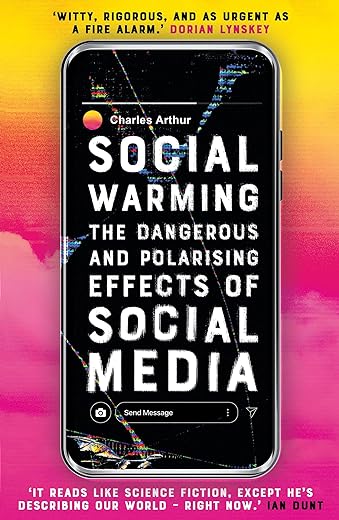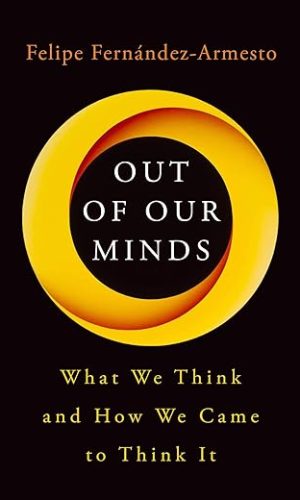Social Warming: How Social Media Polarises Us All
£9.60£10.40 (-8%)
‘Witty, rigorous, and as urgent as a fire alarm’ Dorian Lynskey
‘Cooly prosecutorial’ Guardian
Nobody meant for this to happen.
Facebook didn’t mean to facilitate a genocide.
Twitter didn’t want to be used to harass women.
YouTube never planned to radicalise young men.
But with billions of users, these platforms need only tweak their algorithms to generate more ‘engagement’. In so doing, they bring unrest to previously settled communities and erode our relationships.
Social warming has happened gradually – as a by-product of our preposterously convenient digital existence. But the gradual deterioration of our attitudes and behaviour on- and offline – this vicious cycle of anger and outrage – is real. And it can be corrected. Here’s how.
Read more
Additional information
| Publisher | Oneworld Publications (28 July 2022) |
|---|---|
| Language | English |
| Paperback | 352 pages |
| ISBN-10 | 0861543173 |
| ISBN-13 | 978-0861543175 |
| Dimensions | 12.95 x 2.54 x 19.81 cm |












by Reaper
I’m among the (I suspect) millions of people who has become so disenchanted with Social Media that I ‘came off’ it some time ago and stayed off it. Fundamentally, I became incensed by the Newspeak of Identity Politics, where people who judge others first as belong to groups (assuming those that comprise them are homogeneous) rather than as individuals (where no assumptions can be made) seemed to shout the loudest and strangely get the most coverage. With jobs and livelihoods being lost by people committed to speaking their mind ( using rational argument and evidence) due to the unforgiving persecution of ‘virtue signalling’ ‘social justice warriors’ who are often simply internet trend following people ‘marketing’ their self-image as being morally unassailable (they of course never ever did or said something now deemed unorthodox), so many of us have reneged on the importance of dialogue, dialectic, debate and freedom to express an informed opinion. How did this happen?
For me, the major flaw with this book- hence four stars- was its failure to really engage with the problem of Identity Politics online as I’ve outlined it above. That aside, I think it’s excellent at explaining how algorithms dictate how and why some Social Media posts ‘go viral’ (as soon as I hear or read that phrase in the mainstream media of TV or press I lose interest in whatever is being highlighted, since it is usually trivia, lies or personal propaganda). Charles Arthur clearly sets out how SM companies use algorithms to one end- to ensure that their networks grow and grow irrespective of content. He looks at the origin of this in the Internet philosophy of free speech and expression that arose out of the semi-countercultural hippy capitalists of silicon valley (the people who dropped acid in the 60s also read Robert Heinlein, of course, so they always had a streak of right-wing libertarianism a mile wide and often a cushion of inherited wealth in their backgrounds), how the SM companies decided it wasn’t their place to moderate content – a viewpoint I can sympathise with, but that has now turned sour as Social Media has become way too influential for anybody’s good, spreading lies, rumour, misinformation an sheer nonsense that its users are too imperceptive to judge as anything but representative as fact.
Arthur includes some fascinating and highly alarming case histories such as how Facebook caused massively political problems in Myanmar (leading to many deaths), outlining how cultures with no background in following the development of ‘online culture’ as its developed since the 1990s (unlike affluent western countires) suddenly acquired mobile phones with Facebook apps already installed, leading the users to think that Facebook was the internet (it appeared that most users had no idea what a search engine was) and seeing it as a reliable source of news.
Arthur also examines the divisiveness of ‘scissor statements’ – brief, non-nuanced comments that people use to show which side of a particular fence they sit – something we’ve all seen (one reason I feel that Twitter is completely explosive – the limit to character numbers means that only axiomatic statements can be made, which is of no use unless you are as eloquent as Oscar Wilde…and even he used a formula for his famous ones….and there is no room for the ifs ands and buts of nuanced Socratic argument). Fake news and how elections are manipulated by SM are also covered extensively.
The book closes with a cogent argument about how SM needs to be regulated- after examining how the SM companies’ talk about regulating (for example) terrorist content goes down a rabbit hole because of algorithms- which I’m still reading as I type this review.
Endoresements on the jacket are from Dorian Lynskey (who wrote an excellent ‘biography’ of Orwell’s ‘Nineteen Eighty-Four’ a couple of years back) and Ian Dunt, who says “It reads like Science Fiction, except he’s describing our world right now.’. Of course it does Ian – SF writers have been publishing for over 100 years on how over-reliance on IT will lead to huge problems. They may have done it melodramatically at times, but then they’re writing metaphorical fiction which needs drama to get its point across. Mathematician Alfred North Whitehead once wrote “It Is The Business of the Future to be Dangerous”, which is virtually a definition of SF. Unless something is done about SM – by people themselves, by stepping back from it, by looking for evidence, by not knee jerking but thinking and becoming more objective, the future will become even more dangerous and facts will be flushed down lavatories online.
A timely volume that every thinking – and unthinking- person should get their head around.
by J. Pullman
This is such an important book. Lots of people realise that Facebook and all the other social media sites are doing harm, but this book explains how and why. It’s a great read – entertaining while bringing home the truth of the situation we find ourselves in.
by Herniol
I have left Facebook almost a year ago as I was struggling with moderate depression. Since then my mood improved tremendously, I have stopped being “short fused” and my partner keeps praising me for my regained patience too. This book reinforced my feelings about social media in general and gave me a deeper insight into mechanisms (algorithms) behind current extreme polarisation of society. Read or listen to it and put that phone down. Have a conversation with a person standing in front of you while you look eachother in the eyes. We still have a choice to end this madness.
by P Clarke
The story of how well-meant connectivity turned sour, on an unimaginable scale. Given that these products often give us great pleasure at first – offering “free” connections and renewed relationships coloured with photos and videos – it’s easy to see why their darker side doesn’t always get a hearing. There’s strong analysis here of what went wrong, and why, and useful discussion of potential ways out of this mess.
The chapter that will stay with me most is on Myanmar; the reckless intrusion of new technology into a country that just wasn’t in a position to handle it, and the horrified consequences – and so many deaths – that resulted.
Strongly recommend it; I listened on audiobook, and it’s read with good pace and energy.
by Dr. Gordon Mckenzie
Connect everyone. Allow you to talk to your friends really easily. Make new friends with similar interests. Find out more about stuff that interests you.
All sounds great. But when it’s all driven by morally-blind algorithms that only care about engagement things quickly spiral out of control, with disastrous consequences. Arthur spells this out clearly, simply, and engagingly. It’s a gripping read, albeit not cheerful. Absolutely recommended reading.
by Martin Kentish
If you’ve ever thought “what on earth has happened to society?” when you scroll though pages of social media posts, then this book is important for you to read and absorb.
Read it, re-read it and let what it says to you sink in. It will illuminate so much of what you see, hear, read and listen to and help provide some sort of framework to discern what is simply noise, and what you need to think about a little more.
by Graeme Barbour
Contemporaneous insight into the influence and effects that social media platforms have unleashed on society. Well written, informative and insightful.
by ANDREW R YOUELL
This book sets out – with clarity and just the right amount of depth – how social media is changing the world…and it’s not in a good way. If you use any social media platform – Facebook, YouTube, Twitter etc…. then this is absolutely required reading.